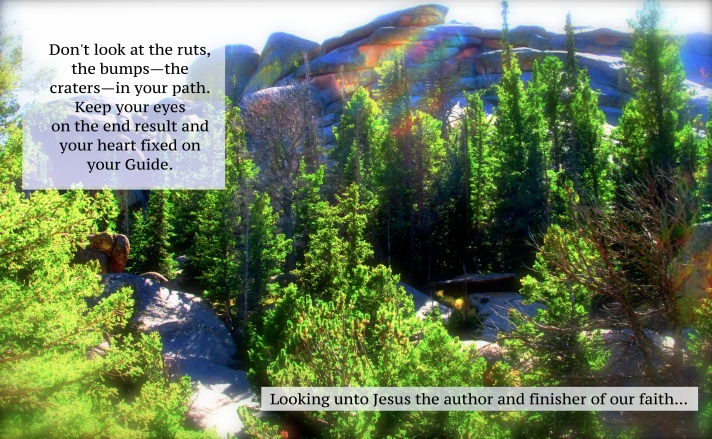I once wrote a story in which a farmer and a cowboy sit atop their horses on a butte overlooking the vast Montana landscape. The cowboy is almost certain he’s lost his mind to even consider what he’s about to do. The farmer assures him that if God is leading him into the venture, then God has a purpose and a plan for it.
“You always make it sound so simple,” the cowboy says, “How do you do that?”
The farmer laughs. “My father always used to say, ‘The answer to every problem is simple, so long as it’s someone else’s problem.”
* * *
Sometimes, life doesn’t seem to offer any simple decisions. Even the ones that should be simple become excruciating when you are making them because you’ve lost the one who normally would have taken care of it—whatever it is.
From outside of the problem, people often feel they know the best answer or solution, and chances are they do have insight that we don’t. They can see a bigger picture. They can see danger spots ahead of us, which are hidden from our view. But, they can’t see the details, and this is where the rub comes.
One of my favorite spots in Yellowstone National Park is Tower Falls. On a hot summer day, stepping up to its base is like walking into an air-conditioned building. As you come down the path, you can see the falls at a distance, and you know that’s where you want to go. You can also see the path winding down the mountain to the river below. All looks well, but there is a problem. A few years ago, a mudslide took out part of the path—a huge part of the path—and it has never been rebuilt. You cannot get to the base of the falls from the path you have taken, but you don’t know that until you reach the point where the path comes to an abrupt end.
From across the river, you would never know that it was an impassable path.

It’s easy for people to look at a situation and say, “Well, you just need to do this.” Their suggestion may be completely logical—with the exception of that cliff between point A and point B. Others’ suggestions may be emotionally based. Their ties to the situation may cause them to want out as fast as possible, to cling as long as possible, or to simply do nothing until they absolutely have to.
With each decision, especially the major ones, come a multitude of opinions, suggestions, and expectations from every corner of life. Sifting through it all can be exhausting and even overwhelming. The thought of making the wrong choice and potentially destroying your life, your job, your ministry, your friendships, and your family relationships can be paralyzing for some, while it shoves others into “flee or fight” mode.
What do you do? How do you make the right choice? How do you preserve those relationships?
Several Sundays ago, I was feeling the pressures of all the decisions that need to be made, the suggested solutions, and the expectations of others. I felt I had to make a decision then. I felt people were getting tired of waiting on me to “make up my mind.” Even though I knew those people had no clue about the details of the path.
In truth, I was probably putting pressure on myself as much as anyone else—I’m good at that.
I have a favorite place, where I go to get away from the noise of life. It’s usually quiet, and is a very good place to walk, take pictures, pray, sing, and read my Bible. So, that’s where I went that afternoon. The mosquitoes were terrible. I wasn’t able to go to the spot where I normally would have gone, but as I wandered the paths—looking for a spot where I wouldn’t be the main dish—I remembered the story of Job.
Job lost everything except for his miserable wife and pitiful friends. And yet, we see him set up as an example. He was the defining picture of faithfulness in times of suffering. Perhaps it all came down to that one thought, which he voiced to his companions,
“He [God] knoweth the way that I take, and when he hath tried me, I shall come forth as gold.”
Job wasn’t looking at the ruts, the bumps—the craters—in his path. He was looking at his Guide. He was also looking at the end result.

A couple of months before Dad passed away, I began working on a new book, which deals with God’s process of refining us. Little did I know the cutting and purging that was about to take place in my life. The book focuses on God’s process of making up His jewels. So, anything in Scripture that is related to this process instantly grabs hold of me.
As I read through Job, chapter twenty-eight caught my attention. Verse two says, “Iron is taken out of the earth, and brass is molten out of the stone.” It is molten out of the stone. You cannot take the ore out of the rock, or the impurities out of the metal without intense heat.
God is doing the same in our lives in the moments, which seem unbearable. He is asking us to rely on Him, to remember that He knows the path we take. He knows it from beginning to end. He knows the beauty that will come from the ashes.
The dead trees are always most visible when we’re standing on the other side of the valley looking back at the forest. In the midst of the forest, we only see them when we come across them—or stumble into them. This doesn’t make them any less real when we’re in the forest, nor does it make them any less dangerous. It just makes them less visible. The same is true for the washed out path and the view from the other side of the valley. The dangers are all still there, but the view is obstructed by the trees—including the dead ones.
So, how do we balance the decisions, the questions, the opinions, the relatiosnhips, the hopes, and the fears?
It’s a little like that butte in the story at the beginning of this blog. From way up there those men can see everything. They see the farm below them, the prairie spreading into their little town, and the fields and mountains beyond. It’s hard for us to get that kind of view in life—but God has it all the time. Keep His perspective in mind. He knows the way we take. He knows the results of each decision we make.
Those quiet moments near my favorite place gave me an opportunity to seek God without interruption. Did I come away with the answer to every decision? No. But, I did come away with renewed peace and perspective. A perspective that helped me think through things with a much bigger picture in mind.
Insights for families adjusting to loss:
- Don’t let the pressure get to you. Hudson Taylor once said, “It does not matter how great the pressure is. What really matters is where the pressure lies—whether it comes between you and God, or whether it presses you nearer His heart.” Take extra time with the Lord, tell Him your struggles, and leave them at His feet. He is a much more capable problem solver than we are. You will never be able to make a decision that pleases everyone. But, if you let Him guide, you can make decisions that please Him—and that is most important.
- Remember that the opinions and suggestions offered by others are offered out of love. They want to help. They want you to succeed. As we go through the slow process of making the decisions, we have just as much responsibility to be patient and loving as those making suggestions for the decisions. It isn’t always easy, but it is right and good.
- Listen to what people are saying, you might see something you hadn’t seen before. Remember they can see the forest and the trees from their perspective, whereas we only see tree trunks, bramble, and the broken paths of disappointed hopes.
- Consider the cliffs between the points on the path. Are they truly cliffs? Are they emotional barriers? Are they caused by things we need to let go? These are hard questions, and may not be able to be answered alone or quickly, but they should most definitely be answered with a prayerful heart and with continual seeking of the Scriptures. Get God’s perspective on the matter.
- Keep the end result in mind. God is using this time to shape and mold you. As you let Him work in your life, He will make you into a person that will better reflect His Son and bring glory to Him. He will build a message in your life that will bring comfort and strength to others. Sometimes, that is a very meager consolation. It’s hard to desire that our troubles will bring comfort to someone else, when we so long for comfort ourselves and may not readily find it. Go to the Lord. He will comfort when no one else is at hand. He will give peace. He counts your tears as precious. He keeps them in His bottle. Let Him hold you. Then, when the time comes, you will be able to comfort others with the same comfort He has given you.
Insights for Churches:
- Be patient. I’ve probably said this in every single post, but it is so important. These are life-changing decisions being made by this family or individual. And, they are being made through the fog of grief. Don’t apply undue pressure. And don’t panic or give up when suggestions bring tears, frustration, or even anger. The person experiencing loss is under a tremendous amount of stress and emotional weights such as they may have never before experienced. Extend mercy.
- Find out the facts. From your position, the decision may be clear. It may be difficult to understand why the family hesitates. Ask. There may be barriers you can’t see—emotional struggles, spiritual struggles, physical exhaustion. Things that are not obvious to the casual observer may be holding the decision back. Finances, a lack of professional skills, a lack of experience, or a lack of confidence may be slowing the process down. Discover the barriers, and help the family walk through them.
Insights for Individuals:
- Don’t get in a hurry. Decisions that seem vastly important today have usually been forgotten a year from now. Pray for your friends. Ask the Lord to guide them and to give them wisdom for the decisions they are making. Sit down with them and let them talk through the situation. Ask pertinent questions—Questions that have to be answered with more than a “yes” or a “no.” Help them get to the roots of the issue.
- Be understanding. The more you know about the situation the better you can understand where they are coming from. Remember that what looks like a simple decision to you may actually be destroying all the hopes and dreams they have worked toward for years, if not a lifetime. It may involve an enormous amount of emotional pain. It may feel like another death. Some will try to cling to anything that makes them feel close to their father/husband, others willingly let things go because the memories cause pain…Walk in their shoes—you might find they rub.
Have you walked this road? What was the most difficult aspect of the decision-making process for you? What was the greatest blessing? I hope you’ll add your insights and thoughts in the comments below.
Has this blog (or any of the blogs in this series) meant something to you? Please share with others. You might help someone else without even knowing it.



